The Culture series is a whole universe built by the Scottish writer Iain Banks. The nine novels, which can be read separately, will remain unfortunately too few due to the death of the author in 2013 at the age of 59 years. Here is their list:
- Consider Phlebas (1987)
- Use of Weapons (1990)
- The Player of Games (1988), the most accessible to begin with
- Excession (1996), a little more difficult as a transition to the second part of the cycle
- Inversions (1998)
- Look to Windward (2000), the most inward-looking text about the Utopia
- Matter (2008)
- Surface Detail (2010)
- The Hydrogen Sonata (2012), The funniest, one of the best, containing all the elements and the richness of the other novels.
- And a collection of short stories, The State of the Art (2009)
Pan galactic society, nine thousand years old, the Culture is not the oldest civilization of this level of reality, but it is one of the largest and most powerful organizations in the known universe. Unlike the galactic empires, the Culture resides at the vanishing point of civilization and anarchist utopia: no centralized government, an immense mosaic of societies not only human, unified by the will to provide its members with the means to their personal fulfillment. “Artificial intelligences” underlie social organization and often are at the center of narratives that describe a coherent universe, an ideal society confronted with its political, historical and sometimes ontological limits and responsibilities because reality does not seem limited to what we know in terms of material universe.
The place of the human, or rather the conscious being, his life, his individuality and his accomplishment, often in terms of artistic creation, are always at the heart of the affairs of these Minds whose (artificial) intelligence, sometimes Machiavelian, their complex personality and varied motivations form the driving forces of many Culture novel’s plots. This small article aims to extract some of the major themes building this universe, trying to preserve as much as possible the discovery of the intrigues for the reader.
- 1 – Plots and Storytelling
- 1.1 The architecture of utopia: figures of excess
- 1.2 Voyages in utopia: the evolution of the narrative structures in the novels
- 2 – Utopia facing reality : the political stakes
- 3 – The machine and the life
- 4 – Borders of the Culture, Frontiers of Reality

1 – Plots and Storytelling
1.1 The architecture of utopia: figures of excess
The obsession with gigantism with Iain Banks is not a detail. We have no idea of the boundaries of the Culture, if it makes sense: it extends over thousands and thousands of light years, immense ships travel at speeds beyond imagination. The very long duration of certain journeys can sometimes occupy a large part of a novel or contribute to its plot (in Excession for example), and the slowness of light can give rise to the commemoration of very distant events in the time span of a civilization thousands of years old (one of the storyline of the “Look to Winward“). The age itself is no longer a limit, a character of “The Hydrogen Sonata” even participated in the foundation of Culture. This gigantism in time often mirrors the architectural disproportion of utopia in space.
Citizens of the Culture live almost always in Orbitals. Constructions of tens of thousands of kilometers in circumference, produced by space-based engineering on the scale of entire solar systems, are huge orbs with highly contrasted geographies: oceans, deserts, mountains, and cities that fit to human size even though these Orbitals can house tens of billions of people. Iain Banks never confront us with an urban hell; on the contrary, the immense and grandiose landscapes of the orbitals most of the time form reconstructions of wild natures, sometimes perilous, in which extreme sports are practiced, and which followers do not always backup their conscience, out of love for risk and even out of fashion. “Look to Winward” presents us a very detailed itinerary of such a world, while “The Player of Games” begins with the presentation of community life and festivities on a human scale. It is possible to find solitude such as comfort or luxury in an environment that seems truly natural. This “communist” society, that is to say, of abundance, offers a multitude of choices of life.
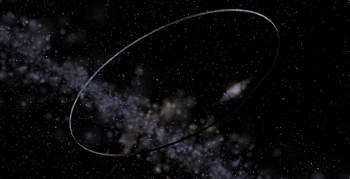
The underlying artificial infrastructure is also staged, as much from the point of view of the Mind who manages the Orbital (without ruling it), as from its concrete description: they are immense communication networks and starships, which can organize the exodus from an Orbital. “Consider Phlebas” presents the destruction of one of them, the first one presented in the sequence of the novels. But it will not be the only one to be destroyed in the one great war that the Culture has known, marking its memory forever. Each novel will speak of the Idiran war, which led it to destroy its own constructions after the alas partial evacuation of the populations, as one of the Minds in charge regrets (“Look to Winward“).
The imagination in science fiction can’t be cut from space ships, but the Culture does not build starships of particularly seductive shapes, Iain Banks defending himself to do so. On the other hand, these vessels hold records of gigantism: real worlds where millions of inhabitants live in forests or huge parks, which are not pure cold metal universes, even though the lower levels of GSV (General Systems Vehicles) include titanic hangars and automated plants. Two hundred kilometers long is an average size for such spacecrafts, which have less definite form as it is complemented by omnipresent forcefields that everyone except the organic creatures manipulates constantly, starting with the ubiquitous drones. Like the ships, the appearance of these drones is also very far from Robby the Robot or Z6PO, and their intelligence and consciousness have nothing to envy to that of organic beings: they are real protagonists of stories, for example In “The Player of Games“.
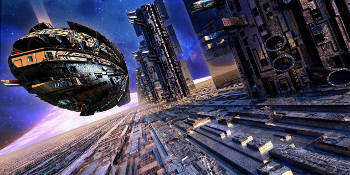
The gigantism of some of the most pretentious spacecrafts (such as the ridiculous Empiricist at the end of “The Hydrogen Sonata“) is not characteristic of all those inhabitants of the Culture that are starships: the types and especially classes of them are extremely numerous, to the extent that it is rare to find two vessels of the same class. Their names often lend to smiles (mountain, desert, plain, comet but also gangster, murderer, psychopath), as much as the names of the ships themselves, which is also the name of the Mind that drives them. The performance of some of the smaller spacecrafts is a major part of the Culture’s military power. The warrior personalities of their Minds are often very thorough and complex and at the same time “realistic”, like Falling Outside The Normal Moral Constraints(a whole program …). The latter can show to his passenger only a replay of a space combat which happened so quickly that it returns to the slow motion, for her as much as for him. His favorite passage: the complete destruction in an instant of a whole enemy fleet spied with cunning for dozens of pages (“Surafce Detail“). This excess of power is also encountered with the complex personality of Mistake Not…, one of the main characters of “The Hydrogen Sonata” which does not pass its time, on the contrary, to show off its power. The last pages of the novel suffice. Widely.
This obsession with gigantism is not the exclusive prerogative of the Culture: the universe is home to immense living beings, true ecosystems in themselves, architectures hardly conceivable as much as their spirit. These are totally foreign intelligences, such as the mysterious behemotaurs in the “Look to Winward” or the Dra’Azons evoked in “Consider Phlebas“, among other entities so ancient that they confuse imagination. “Matter” takes place in a hollow sphere where a planet like the Earth would lodge without problem; it forms part of a series of mysterious constructions, the Shellworlds, some of which containing at their center a senescent species representative to which a cult is rendered. These creatures are nevertheless “younger” than the spheres themselves whose origins and functions are totally forgotten. Their age goes back several billion years.
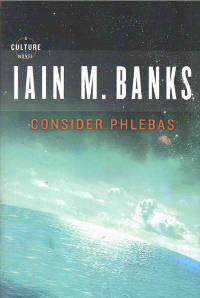
1.2 Voyages in utopia: the evolution of the narrative structures in the novels
If the universe of the Culture is very coherent from one text to another, the conception of the novels and their narrative evolves greatly as the cycle progresses. A hinge (“Excession”) can be traced between the first three novels and the subsequent ones, separated by a 6-year break between their writings.
The very first text, “Consider Phlebas“, is a long adventures novel that reveals quite completely a universe whose foundations will not change. The plot linearly depicts one of the last representatives of a humanoid species, a changeling, who chose to fight the Culture in a merciless war. The memory of the conflict will be prolonged in each text that will follow, from the brief evocation to the major forces of the narrative (“Look To Winward” commemorates a supernova provoked during this war). The author takes the point of view of the enemy, who will lose, with all the ambiguities and doubts of such a choice: the preference of life to a universe of machines like that of the Culture, dominated by AI. We move from world to world, from planet to Orbital with a band of mercenaries as sordid as they are attaching, through action scenes that could give rise to spectacular cinematic adaptations, such as escape from spacecraft outside the hangars of The Ends of Invention GSV, or the eventful exploration of the world of Schar’s tunnels.
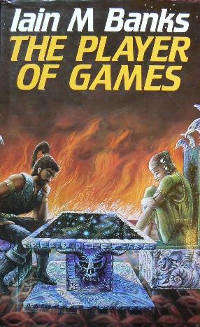
The two following novels, “The Player of Games” and especially “Use of Weapons” are still adventure novels, but their conclusion conceals a complete return on the whole narrative’s meaning. The Machiavellianism of a very particular organization within the Culture, Special Circumstances, turns the whole meaning of the narrative upside down just at the ending. How does the utopia of the Culture confront itself with reality, with which spies and special forces does it apply its policy? The representation of violence and destruction, however, is never an end in itself, but always a confrontation of ideas of justice and harmonious social life with reality. Such an encounter calls for extreme responses. In “The Player of Games,” the way the main character slays his penultimate opponent, following the clash of his confrontation with the abject reality of the society he is visiting, is one of the most powerful passages of the entire cycle. But this scene does take place on a game board. It is not necessary to accumulate the most spectacular material destructions, the description of the levels of violence, injustice and tyranny of a society out of utopia is enough to provoke an extreme reaction of the representative of the Culture. It expresses nothing but what he is, that is to say what its world has made of him. We will at length talk about the freedom problem this implies.
The sequence of machinations and progressive turns of the plot meanings, ways of playing with the mind of the reader while the characters of the novels try to manipulate the reality for reasons often doubtful, invades most texts, in particular “Excession“. Then the stories and points of view multiply in a narrative becoming more complex than the simple linear sequence of an adventure.
For the first time, “Excession” stages the Culture’s Minds and their e-mail-like mode of communication, with technical jargon that Iain Banks will eventually let go (although such communications will be at the heart of the last novel, “The Hydrogen Sonata“). It soon becomes clear that these communications between ships during long space travels are part of a complex plot, the implicit behind these messages to many recipients reflecting the fracture lines underlying the Culture itself and its political orientations, at the moment when arises some kind of unforeseen singularity (“Gulp!”, says the Fate Amenable To Change UCG facing the “problem”). It is beyond the scope of the previous adventures novels, even if the stakes of those contained in filigree much more than a personal destiny. The human dimension is not abandoned, however, and it is fascinating to see how the most central information is obtained from humans by AIs respecting their principles while other easier and agreed science fiction universes will resort to violence, torture or the most destructive mental manipulation. Human characters present their own stories, which intertwine with those of AIs. The perfect human futility thus alternates with a cosmic and tragic dimension in a complex web whose stakes are unveiled only through surprising reversals, a very long space journey unifying the plot.
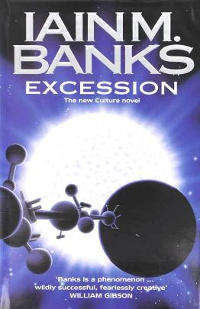
These numerous points of view, histories that are expected to overlap, sometimes sordid machinations, grandeur in modesty as petty pettiness among the most powerful, and the mirroring of all these contradictions, will constitute the narrative structure of the most of the following texts up to the last masterpiece, “The Hydrogen Sonata“, including the complexities of “Surface Detail“. Iain Banks knows how to give substance and plausibility to the most unlikely personalities of artificial intelligences whose minds completely surpass the human ones, confining themselves to divinities which they, however, never are. These AIs must make decisions in the real world, they involve difficult but very clear choices and the consequences are major when it comes to the history of this utopia. The modesty of man and the unthinkable power of beings that can no longer truly be called machines are systematically mis-en-abyme, putting each one before his responsibilities if the only true progress that matters remains of moral essence. We are far from jubilation in front of the power of technology, even if a small (or big) space battle remains enjoyable.
Alongside these tragic and deadly stakes, the reading of the novels that make the Culture series remains a pleasure tastefully maintained by an author who distills the situations and characters with a fierce humor, an irony always present and a sense of absurdity consummated. Many situations are depicted in a very raw language, bringing the reader closer to these fabulous characters. Beyond the often derisory name that these Minds choose, one thinks for example of Marai Ziller who, in “Look To Winward”, seeks to escape at all costs from one of his compatriots by multiplying the most futile explorations of the Masaq orbital (this explains the so many travels in all directions in this immense world, true journey inside the utopia). One finds, for example, a desert flanked by rather absurd pylons, which are traversed by a half-ruined means of transport which Central, the mind in charge of this world, will be obliged to come and tinker with. But among so many other things, let’s mention the Antagonistic Undecagonstring, an improbable instrument for playing the hydrogen sonata, or the scrap carcass and the servile behaviors that are obliged to assume the drone of “The Player of Games” to make believe in the technological underdevelopment of the Culture.
2 – Utopia facing reality : the political stakes
Almost all the beginnings of the novels present us with the interior of an utopia, to better emerge towards very different worlds and civilizations whose technological level of development never really threatens the power of the Culture. But then, why interfere with the life and society of others as does the Contact section, in charge of “diplomacy”?
It is known that Contact deploys agents to very different peoples and cultures, in the utmost discretion, without equivalent to the “first directive” so important in another utopia called Star Trek. “Inversions” describes the life and the delicate role of two Contact agents who observe a human society coming out of the medieval period. They do not have a ban on the delivery of foreign technologies, but they do not seem to be trying to hasten the “progress” of this civilization. Their influence, discreet, is related to their personality: the doctor teaches a certain number of things to his assistant, but can the ethnological gaze be freed from a subjective investment? The parallel activities of these two agents in touch with the mighty and their intrigues lead the reader to await a meeting of these star-crossed destinies, or even the information according to which each one is aware of the presence of the other. Will they meet each other? It is an image of the reasons for the Contact observation policy: such societies are interesting, even if they are centuries distant from some kind of a First Contact. How many such agents have been able to deploy, on how many worlds, and how long do such missions last? Moving and poignant novel, different from the others, “Inversions” may not have received all the appreciation it deserves.
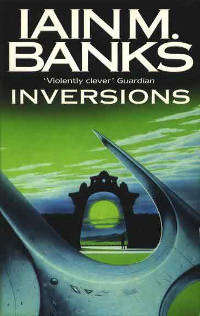
Relationships are deeply different with other civilizations that have reached the stage of space travel. The Culture observes them to anticipate any unpleasant surprise, as in “The Player of Games“. To what extent does Utopia carry a model that can legitimize to intervene directly in history, politics and foreign societies? To what extent should the anticipation of a near future lead to actions, sometimes radical, to guard against potential threats? Every state has his spies. Even if the Culture believes itself to be the best and morally the purest, it is no exception.
Special Circumstances, the dedicated section of Contact, recruits its agents by observing very finely and thoroughly the billions of people who populate the Culture’s worlds and Orbitals. Some find the meaning of their entire existence in defending a model of society they deem ideal, but for many ones the motivation is that of a life of adventures, dangers and what their world can offer as the best and more difficult. They are endowed with major personal, bodily, improvements by becoming considerably increased life forms, as described in Chapter 10 of “Matter“, improvements whose Anaplian, an agent non originating from the Culture must give up to return to her home world.
The Culture, however, does not just recruit its agents from its own elite to do the dirty work. The ones who do not embarrass themselves with moral doubts and existential questions will be the most effective. The concrete forms of this effectiveness confirm the particularly doubtful character of SC’s actions, which even disavow its own agents in a very authoritarian way when they are, perhaps for once, doing something constructive. “Use of Weapons“, explicit title, describes the difficult journey of Sheradedine Zakalwe, who is not a native of Culture but dedicates his life to it. Or his lifes, because the medical power of this distant future makes it possible to repair almost any wounds of his agents after their missions. This novel shows us the personal itinerary of an agent with a complex personality and dubious actions, which will be found at the end of another novel: he becomes the “model” of the one to whom all the worst missions are entrusted for his greatest personal suffering. Here as elsewhere, the staging of violence reaches extreme levels.
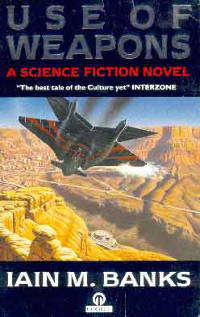
Cheating and duplicity are also present in the methods of recruiting agents who are among the most brilliant elements of the Culture itself. In “The Player of Games“, Gurgeh assumes the role of ambassador of morals and values in which the reader can recognize himself, regarding to the society he visits. If nothing predisposes him to become an agent of SC, the surrounding machination to force him to collaborate, the accumulation of lies and manipulations during his mission show a Machiavellianism devoid of any moral sense at the root of the acts of the Culture in contact with other societies. Who is the real cheater in this extraordinary story’s intrigue? We find the same manipulations and lies with Yime Nsokyi in “Surface Detail“, where an agent does not even need to know that she actually works for SC, which is very dangerous for the agents but also awkward for the very actions that CS is trying to carry out.
If the existence of Special Circumstances raises the problem of realpolitik in Utopia, the actuality of such a questioning is indeed a mirror of what we are (say, for example, the activism of the Iain Banks against the American intervention in Iraq in 2004) and the dubious morality of actions whose ends are considered as irreproachable. Does the end justify the means? Even the best of utopias does not escape the question. If a great power involves great responsibilities, what will be the price? Let’s consider an intervention in a democratic process that will precipitate a particularly deadly civil war on the pretext of putting an end to a caste system, intervention that will in return provoke an attempt of a considerable terrorist attack orchestrated in part, it seems, by dissident factions of the Culture itself. “Look To Winward” then crosses the broken people who have experienced war and death, for having suffered it but also for having given it by the use of a power so disproportionate that it ends up causing unbearable damage to any consciousness, was it “artificial”. One thinks of the “I am become death, the destroyer of worlds” of Opennheimer. Iain Banks shows us that any utopian construction, so far removed from reality, seems to remain a metaphor of the present and a mirror of ourselves. A pacifist faction of the Culture almost seceded, proclaiming itself as the Authentic Culture, precisely in relation to the moral compromises of SC. We meet them briefly in “Matter“.
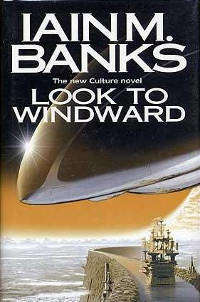
The chronology of novels is also that of the Culture’s history. The intervention in the Chelgrian society we have just mentioned is not without consequences on the margin of maneuver that is left to this civilization in the following novels, about causes that would nevertheless justify a more marked intervention like the destruction of the virtual hells of the penultimate novel (see below). The Culture has its hands more and more linked: it deploys forces quite considerable everywhere for prudence with “night watchmen”, but can no longer act as a righter of wrongs where it would seem necessary, leaving the individuals struggling with their own choices, to assume their freedom. The Utopia of Iain Banks is then the opposite of totalitarian universes, as well-intentioned as they pretend to be, which choose to make the happiness of their subjects in spite of themselves: it is the price of freedom. Falling Outside the Normal Moral Constraints, the Mind, armed hand of the Culture in “Surface Detail“, has a lot of fun deploying a disproportionate power without any personal moral consequences since it is devoid of remorse, as he states at he end of the novel. Lack of conception or corollary of its very nature as conceived by its fellows, who do not seem to appreciate him much, such as the Mind at the controls of the more peaceful GSV Sense Amid Madness, Wit Amidst Folly? Still, this Abominator with a personality as complex as his relations with humans (we will come back to it) also does the dirty work that allows peace within the Culture. And those who believe pulling the strings are confronted with pawns that know how to take their autonomy. Consistently, Iain Banks explicitly states in “Matter” that SC agents are by definition those who can not simply follow orders.
Utopia is thus not unrelated to the war that haunts its memory through each of the novels, as we have mentioned. The omnipresence of such events in the collective memory is an indelible task on a society which can no longer claim for perfection after such horrors. Utopia is always presented in its contact with reality, never as a pure crystal bubble posited worthily and abstractly above the reality of a world of violence and hatred from which it cannot escape.
Finally, the complexity of themes and intrigues never leads the Culture Series to be summed up as a series of espionage novels on the background of space opera featuring various SC agents. These sometimes play only a background role in vertiginous frescoes where the various intrigues do not necessarily overlap (“Surface Detail“). In “The Hydrogen Sonata” where the role of SC is virtually non-existent, the Minds directly take charge of their actions. However, these beings who are the true masters of the Culture can not often intervene concretely in the course of events: they are gigantic spaceships. Their instruments are then the most deceitful beings presented to us, those whose arrival is always suspicious and which give the reader the idea that something shady is traced behind the scenes: drones, small Artificial Intelligences, extremely powerful and cunning, endowed with a characteristic all the more asserted that their wholly arbitrary body form does not satisfy the aesthetic canons of a science fiction more easily spectacular. Iain Banks knows how to portray the psychology of such “artificial intelligences” at the heart of the reading of its intrigues. “Big sturdy drones?” No, nasty little drones” (Look To Winward).
3 – The machine and the life
The current surge of interest about technological singularity extends the “danger of the machine” problems exposed in already old sci-fi novels. This theme is not treated by Iain Banks in the mode of anxiety. The Culture society is well taken care of by these human creations which have long since surpassed their creators in power. These “machines”, drones and Minds, must have been, at the beginning, some sorts of “computers” or “artificial intelligences”. The question of the unpredictability of the future that defines the technological singularity as a moment in time no longer arises: the Minds are the real masters of the Culture, they make its politics and their drones are more than mere instruments since they are conscious subjects . The changeling at the center of the first novel is committed to the side of the Idiran theocracy against this universe of machines, which he believes are contrary to life, and this is not without asking him questions or difficulties. Is the view of Bora Horza Gobuchul justified? Are we dealing with the Star Trek Borgs, 2001’s Hal or Terminator’s Skynet? In Stargate series, the sole purpose of the replicators is to reproduce themselves identically in a totally maniac way, transforming the whole universe to their image and enduring no otherness. Iain Banks believes that an artificial intelligence assuming this end would be very unlikely, for such a universe would no longer have any interest (or fun). A special section of Contact is responsible for this problem posed by civilizations “a little too enthusiastic”, Restoria (“Surface Detail“). The life of intelligence is nourished by diversity.
In “Look To Winward“, Central, the Mental of the Orbital Masaq, gives a complete portrait of itself, its activity and its history (chapters 11 and 13). Talking about gigantism, the multitasking of our computers makes possible to approach what a Mind is. Central is not only several million simultaneous versions of himself in avatars, in touch with the billions of inhabitants of the world that it supervises without ever directing or controlling it, he is something other than a supervisory authority for an artificial world that would contain our planet several times, he is more than a Guardian who watches and prevents possible catastrophes and collisions in its solar system, sometimes transforming them into spectacles. Witnessing astronomical events prodigiously distant, he is constantly in contact with thousands of other Minds scattered in the galaxy, mainly ships, with which he maintains bonds of friendship, and intervenes in the construction of other Minds who will come Possibly modify himself; he cares about what can happen on infinitely distant worlds where life still abounds. Such a description of the intuitive grasp of the infinite is an instant confining to eternity. At the other end of this chain, in a moment when we, humans, can have twenty ideas, he has billions in a relationship to time that goes so much beyond human that we can start talking about transcendence. The hardest thing in his daily life is perhaps to endure the bores … But the Chelgrian composer who endures this description can talk to him about his personal problems as long as he wishes, he who has just asked Central if he has finished with this portrait of himself in a page not devoid of a somewhat desperate irony.

Iain Banks then considers that such “machines” can not be blind morally, or so drowned in their own power that they shut themselves up in themselves. Quite the contrary: Central in person tells us of his moral conscience, at the end of a very long life, with remorse all the more keen that murder or personal responsibility are felt very differently by a being whose relationship to time, to the memory and the duration of the events of which he was actor have nothing to do with the limits of the human mind from which he is freed by nature. He is not beyond any moral conscience in front of life. To the antipodes of the Nietzschean sur-human, the Mind is still far from the divinity. Living and artificial beings conceiving and constructing themselves, they have for the most part become too wise to take themselves for Gods. They are “simply” living and conscious artificial beings.
Central, Sleeper Service, (the central character of “Excession“), and many others like the ship Beats Working in “The Hydrogen Sonata” are authentic characters confronted with reality, trying to give the better of themselves in being fully aware of their responsibilities (how such minds would not they?) and trying to make the difference. The talent of Iain Banks is measured by the depth he gives to such characters. As complex personalities, these non-human beings are the first actors of vertiginous intrigues, with living beings more modest but no less complex: the biological entities that are men. The question is never whether the machine will one day pass beyond man, it is done, irremediably. The problem is rather to know what place the “machine” leaves to man in such a universe. The answer is simple: the place of man and life is absolutely central, it is the responsibility of the machine. This theme is present in all novels, that’s why we can talk about Utopia.
In “Surface Detail“, the human Ledeje Y’Breq is not a super heroine, but a slave abused and murdered. After being carefully taken care of by a GSV who ensures her “resurrection” and her integration into a foreign universe, we discover a very ordinary person driven by a deep desire for revenge, who encounters great difficulties evolving in a complex and hostile universe, caught up in a political intrigue that she does not perceive herself. The starship Falling Outside The Normal Moral Constraints takes care of her after subtracting her from the Culture. He will protect her carefully in the lethal environment inside the ship during a space battle. It is not simply about conveying a valuable biological cargo, but considering her as a real person and of taking an interest in her, not merely apparent or polite, even if this politeness is not always reciprocal. The gift he offers her, a technological jewel with an innocent appearance, is totally disinterested but will prove very useful. The ambiguity of their relations is not pushed to the end of their possibilities; Lededje asks herself whether she wants to sleep with the avatar, like Anaplian in a parallel scene of “Matter“. The deep friendship which the ship feels for her will lead him to relieve the human consciousness of the weight of the murder which she nevertheless pursues throughout the narrative.
The psychological stability of AIs over the ages is not without raising question.
The colossal computing means of Culture also provide humans with immortality in terms of storage and backup of their consciousness, including reimplantation in bodies that may be only transitory. The character of Scoaliera Tefwe in “The Hydrogen Sonata” is absolutely not fooled by manipulations explaining her awakening, and will not allow herself to be reduced to the condition of simple tool.
The urgency of Scoaliera Tefwe’s mission can still wait until she has the means to contact a very old drone living apart in a distant desert, in the somewhat absurd sand garden he has built. Such a character also hates to be manipulated for the sake of information. The Culture agent will insist on taking her time to visit him before responding to this powerful, artificial intelligence. Even if the stake is the subliming of a whole living species …
We will also think of those Minds who become “eccentric” and cut themselves off from society to pursue strange goals that only them can understand. These are for example the frozen human theaters reconstituting historical battles that built Sleeper Service in “Excession”.
But what becomes of man himself in such a universe of benevolent machines? Genetic manipulations have improved him beyond any eugenic consideration: this problem at the heart of certain major dystopias (Huxley) is never mentioned. Humans can change sex at will, give birth when they want, and have glands in them that generate all kinds of drugs without addiction, or even cut the pain. The average lifespan in the Culture is 400 years, which can be lengthened even if it seems reasonable that life would come to an end. Iain Banks summarizes these points himself in an article available online: http://www.vavatch.co.uk/books/banks/cultnote.htm
If the place of man in Utopia is not to direct or supervise society, nor to conduct diplomacy, if there is curiously quite no scientific research staged, and finally, if human agents are necessary to execute certain low works, there remains a role which the Minds do not seem to be able to hold: that of artist.
In the cycle of the galactic center, Gregory Benford staged a parody of artistic creation due to real machines hostile to life. Nothing of the sort in the cycle of Culture, except a vague resemblance to Sleeper Service’s human tableaux. Can a Mind conduct a symphony in the place of a man? The answer is yes, but a conductor is not, absolutely speaking, essential. Then, could a Mind compose a symphony in the manner of a composer by a mimic of his style in a totally convincing way? The answer is also positive. But Ziller, the composer, does not ask Central (“Look To Winward“, chapter 13) if he could compose a truly original music. We do not have the answer, but we also have no example of a Mind who would really be an artist. This is certainly the limit of those entities so far beyond human, and the reason why we remain interesting.
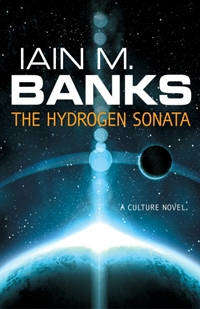
Society of extreme wealth and abundance, Utopia of the excesses in space, time and powers of the mind, the Culture leaves to man the place of his personal fulfillment outside of politics, which perhaps explains that true wars are also limited. In this universe of science fiction at the end of technique, fundamental research and the enjoyment of power are rarely shown and never are the stakes of intrigues. These are just means. It is regrettable that Iain Banks does not stage a philosopher,, but maybe is it his own role… Man is thus able to do what he pleases for his existence: machines can even help him get out of his boredom if the games cease to seduce him (“The Player of Games“), he may practice the most extreme sports by choosing the ability to actually die there, he may wish to rub shoulders with danger and adventure among SC’s elite. But above all he can lead Utopia through beauty; the most important dimension of the Culture is art, as any writer may wish.
4 – Borders of the Culture, Frontiers of Reality
Three problems show the finitude of man and the opening of religious perspectives: God, the immortality of the soul and human freedom (Kant). Iain Banks is not ignorant of any of them.
The only real enemy of the Culture is a theocracy, with which it will engage the Idiran war that goes through the whole cycle. This is hardly surprising for a society without God or affirmed religion. Iain Banks treats the traditional questions of religiosity in his work. We have already mentioned those of the limits of the human mind from which the Minds are freed, and who never consider themselves as Gods. If the Galaxy is full of very strange and ancient forms of life, nowhere can be found any divinity, no matter what kind of beings we are given to meet. Yet some of them far outstripped the power of the Culture, such as these strange Bulbutians of “Surface Detail” in contact with the Sublimates. In “Matter“, no one thinks of worshiping the missing builders of the Shellworlds. In the center of some of them, very mysterious entities have taken refuge to finish an existence of which we will learn nothing about, but they are not sleeping deities whose power would only wait for a threat to wake up. Nevertheless, a cult is rendered to this inhabitant in the center of the world by a relatively primitive society … Chapter 18 of this same novel exposes a very clear and classical debate on the theological sense of Evil, which calls into question the possibility of a moral author of the universe.
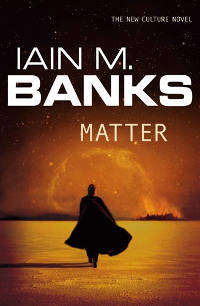
As to the question of the nature of the soul and its reality, Iain Banks adopts a clearly materialistic position insofar as consciousness and “spirit” can exist with a clearly material and artificial substratum, even surpassing what is capable of man as such: the Minds like the drones are there to prove it from the start. But above all, human survival beyond bodily death has become trivial.
Regarding the freedom that the “soul” can demonstrate and the moral responsibility of each person facing his own actions, “Surface Detail” portrays characters in front of their own choices: they are not the pawns of their society, and are therefore responsible to themselves. That is all is left to them, and it is immense, on the contrary of what Abigial Nussbaum seems to say in her review of this novel ( http://strangehorizons.com/non-fiction/reviews/surface-detail-by-iain-m-banks/ ).
The Culture leaves everyone free from their choices and their moral consequences, even if it would be simpler to have agents actually in command. But in the end, everyone is responsible to himself, without Hell or Paradise to judge him; the reality of politics sometimes leads to the impossibility of rendering true justice. Can the individual be satisfied with revenge, if that is all he has left? The depth of the personal bond between a woman and a machine, as free individuals, is strong enough for the machine to relieves the woman of her moral conscience, the Abominator himself being deprived of it. Maybe because he was conceived as a warrior? Zakalwe has hardly any moral conscience, but he is human.
There is, therefore, no Hell for the wicked, or rather there should not be: it is the whole theme of the “Surface Detail“. Virtual Hells (french translation of this novel’s title) become possible once exists a means of preserving the individual consciousness after corporeal death (still one of the stakes of transhumanism, that crosses all the cycle of the Culture). From the moment when technological means ensure immortality, why wait until consciousness dissolves into nothingness in order to hope to verify the existence of a very hypothetical beyond, when it has become accessible to everybody, as “plugin” of the psyche? Thus religions become largely obsolete at a certain stage in the technological evolution of all societies (“Surface Detail“, Chapter 8).
But if extending individual life in a virtual universe becomes possible, one can also invent all sorts of punishments in universes where violence and cruelty seem unlimited, in pages where an imaginary of blackness is started over again and again : the eternity of Hell. All that is needed is sufficient computer support, which must be considerable enough because many galactic societies, followers of these moral punishments, will interconnect their own underworlds. The argument that the establishment of such virtual worlds is not a proof of civilization does not really convince societies with sufficient military power, but the simplest is perhaps to decide the question by war, precisely in these virtual worlds: the War in Heaven is triggered. However, it is necessary for this war not to leave this virtual paradise … The Culture having the hands somewhat tied because of his clumsy interventionism (see before), the Quietus section of Contact which deals with the affairs of the dead (and which is not a funeral home) can not be directly involved. It will nevertheless be necessary to go and see what is going on in an absolutely considerable political imbroglio which begins to take shape around a gigantic artifact whose origin are lost in the mists of time. This novel renews the universe of the Culture by its theme. In a complex plot, her very moving characters are once again confronted with their personal responsibilities, consequences of their freedom in this present world, in the complexity of their society, and not only in a cybernetic backdrop of eternal punishments.
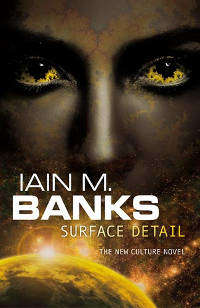
There remains, however, the question of whether there is another world or not, another reality than this one, which gives the notion of transcendence all its meaning as a vanishing point in the history of whole civilizations. Is there an afterlife? The theory of strings and multiple universes seems to suggest that our reality is not the only one, in one of the few passages in which Iain Banks seeks in contemporary physics a ground to his speculations (The Hydrogen Sonata). The problem of subliming is a leitmotiv throughout the whole Culture series (as a parallel with the Stargate TV series). What have become of the most advanced galactic civilizations since the billions of years past, beyond the traces of a vertiginous power (“Matter “). These are the frontiers of the Culture: almost nothing appears from a beyond, of which there is no doubt. “Excession” is entirely devoted to this theme, “a kind of test. We were judged and then declared inadequate.” The narrative ends with an instant of infinity, a few allusive lines to that which may extend elsewhere, and for which the Culture civilization has proved utterly unworthy; how can we say anything else after the spectacle of the despicable schemings given by the most evolved Minds in our plan of reality throughout the novel? Remains the flee to another galaxy, but it may be a little too populated …
There are still some examples of contact, some images and traces of the afterlife, and even a Mind who has come back but will not tell us much in “The Hydrogen Sonata“. Around those who leave, various forms of scavengers are still trailing, not all of which are necessarily despicable in the eyes of the Minds who are concerned about the infinite diversity of life and intelligence. In this ultimate novel, the Culture will have the opportunity to recall its past and its memory in a throbbing journey towards its origins, based on one of the major meanings of life: Art.
Thus the Culture universe finds a marvelous open ending with this civilization, the Gziltes, which proves to be very human, rich in its contradictions, greatness and mediocrity, but which nevertheless succeeds in flying all the same towards a great Unknown who haunted all these bright gems of science fictions that are these nine novels. What more beautiful image could offer its author when leaving us?
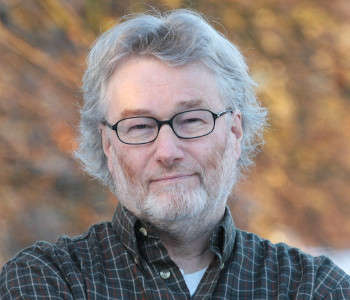
Yves POTIN

